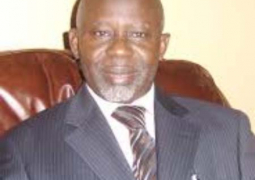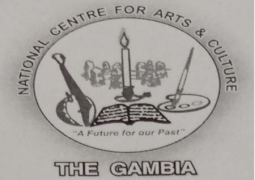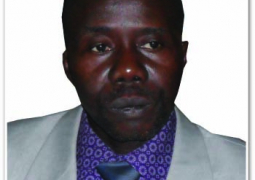
The Secretary General of the opposition Peoples Democratic Organisation for Independence and Socialism (PDOIS), Halifa Sallah Friday held a press conference with the media in Senegal on the sidelines of a weeklong meeting of African researchers organised by CODESRIA.
Below is the full text of the Communiqué read out by Halifa Sallah to the media in Senegal:
I am holding this press conference by coincidence. I am here to attend a Selection Committee meeting under the auspices of CODESRIA that is the Council For The Development of Social Science Research in Africa. I had a tete-a-tete with Alioune Tine, the Director of RADDHO who appreciated my honest opinion on the situation in The Gambia, as a political leader resident in The Gambia and active in politics for the past 24 years, who further advised that I should hold a press conference to help people in Senegal to fully understand the complex political and human rights situation in The Gambia.
First and foremost, I would like to emphasize that the African peoples yearned for Independence so that they would earn two things: liberty and prosperity.
After 17 years of Jammeh’s rule, there is neither a viable public or private sector that is able to generate youth employment to provide for the over 300,000 youths who come out of our school system every 12 years of the educational cycle. The bulk of the employees per sector are teachers and nurses who are underpaid and overworked. The dalasi continues to slip in value, the cost of living continues to go high and diet related illnesses like hypertension and diabetes continue to rise. The farming community continues to earn very little from farming, while many of them are mobilised to go and farm for the President. The public enterprises of the Government do not pay any dividends. The Government depends entirely on taxation to earn the significant part of its income. Tax revenue is estimated at 4 billion dalasi while non tax revenue contributes only 571 million. Even people who earn 650 dalasi a month are supposed to pay tax. This is less than 1 dollar a day.
Hence taxation is leading to further impoverishment of the people and the collapse of small enterprises. Instead of promoting prosperity, the Government is enhancing poverty. Since the income tax is not sufficient to meet government budgets the government relies on loans and grants to build infrastructure, thus leading to heavy indebtedness and resort to debt relief. Needless to say, such loans, grants and debt relief could only be sustained in the face of respect for human rights, democracy and good governance, concepts that President Jammeh takes a gibe at every time he has the opportunity as if Gambia does not belong to ECOWAS, the African Union, the Commonwealth and the UN which have protocols advocating for those values.
The debt of the country is over 16 billion dalasi.
PDOIS is convinced that President Jammeh’s government does not have the capacity to redress the deficit in prosperity in the country.
This is why we have been offering an alternative. Today, if one were to ask the government, they would say that they stand for private sector-led growth. However, few Gambians dare to stand and be counted as millionaires.
Gambians abroad contribute approximately 1.7 Billion dalasi annually in remittances.
A PDOIS Government would have established an investment Bureau for Gambians in the Diaspora so that they would be properly guided on how to invest their earnings through joint ventures if need be and further build residences at home.
We have said that no government could rely on taxation to meet recurrent expenditure and build infrastructure. Today, the Arab countries depend on sovereign national wealth to meet the needs of the population, and not taxation.
Something is being mined in Sanyang. We have been trying to find out without any official response up to today. A PDOIS government would rely on such minerals to increase sovereign national wealth so that we could increase public sector investment on infrastructure without necessarily increasing the tax burden on the people. We would also manage public corporations so that they yield dividends to enhance non tax revenue.
Now, let me treat the issue of liberty. Every month, the Foroyaa Newspaper which was founded by us will have the list of all detainees without trial, under the caption ‘detention without trial or disappearance without trace.’
Most people who claim that the opposition is dead in the Gambia rely on this for facts. There is not a single person who is missing or detained without trial which is not published by us. Any name that is not seen, know that the family has refused to cooperate and it is not also uncommon for families to drive our reporters and accused them of meddling in their affairs.
Hence, we are not only functioning as a political party; we are functioning as the most effective human rights defenders in The Gambia.
Take the incident of April 10 and 11 during which the children were gunned down. Sidia and myself were in the streets. I contacted officials to caution them on the gravity of the situation, and I wrote a series of letters and reports which gave eyewitness details of what happened, which are now part of the Commission of enquiry into the incident.
Take the witchcraft scenario, where people’s fathers and mothers, husbands and wives, sons and daughters were being taken to isolated locations to be held in captivity, and made to drink hallucinogenic concoctions. Who stood to stop it regardless of the peril or the cost? We do not only criticize human rights violations; we have engaged in civil disobedience to stop it, when necessary.
Hence, there is a deficit in liberty in The Gambia. Media houses have been closed down, and various operations launched which create a climate of fear. What is important to note is that we are actively opposing all these things on the ground, and this deserves to be recognised.
The burning issue for most of you is what is the way forward for The Gambia?
Politics is about the power of ideas, and the power of the masses. Political science teaches that change could come by the ballot, the bullet or the mob. In all three cases the masses are the determining factor.
We have stated very clearly that to engage in military action without mass support would end up transforming such initiators into rebels without power. As in all rebel movements, contest for power is done through the barrel of the gun and the nearer they get to power the stronger the contestations for leadership.
It goes without saying that to call for mass uprising without the support of the people is to place oneself in the hands of one’s adversary as a captive rather than a power broker.
Now one may ask: Could the ballot bring about change in The Gambia?
PDOIS is convinced that President Jammeh’s party does not enjoy popular support. Six opposition parties decided to challenge the Independent Electoral Commission to reform the electoral system so that the soldiers, police, traditional rulers, civil servants and government resources would not be utilized to give the advantage of incumbency to the ruling party, before we would participate in the National Assembly Elections. They refused to reform, and we were excluded.
The results are very revealing.
My answer is simple. Politics is about the might of ideas and the might of the people. Democracy is about the power of ideas and the power of an organized people. Ideas enable people to own their minds and become Independent Decision makers. Organisation of the absolute majority of the people in support of a given person, party or choice facilitating mechanism is necessary for them to tip the balance of power. The Opposition in the Gambia must be able to mobilise the vast majority of people on its side to effect the Change that is necessary.
Out of a voter list of 796,992 registered voters and 48 Constituencies only 23 Constituencies were contested. Out of the 308,489 registered voters in those 23 constituencies, only 154,920 voted. Many Independent Candidates stood in the absence of the opposition with one exception, the NRP, that of Mr. Hamat Bah.
Jammeh’s party had 80,289 votes while the Independent candidates had 60,055 votes. If this is added to NRP’s 14,606 votes, the votes of those opposed to Jammeh’s party would be less by a margin of 5,628 votes.
We are therefore convinced that if the opposition adopts the right strategy it could oust Jammeh through the ballot box, as has happened in Senegal.
This leads us to the question of the strategy of the opposition.
I was the leader of the Opposition in the National Assembly from 2002 to 2007. When we realized that Gambia is more important than our posts, we sacrificed to form an Alliance called NADD. Since there is no second round of voting, we called for a Primary to be held if we could not reach unanimity in selecting one candidate. The Candidate would have served only one term and would not have stood again, but would have helped to build a genuine democratic system. The Alliance broke up at the 11th hour. In 2011, we again called for a primary to select one candidate for the opposition, as has happened in Venezuela recently, but that also did not materialize.
Now, we intend to turn the cards on Jammeh and call on the world to give us support so that we will restore the second round of voting, and surrender to electoral reform. This is our campaign. We want all the political parties in the country to start the campaigning now for a restoration of the second round of voting, and further strengthen their grassroots bases so that if we have the second round we would be able to deprive Jammeh of 50 percent of the votes thus enabling all the parties to unite and defeat him in the second round if he even succeeds to pass the first round.
On Relations with Senegal
PDOIS sees Senegal and Gambia as one people living in two states. However, we are Pan Africanists. Nkrumah had identified the need for Africa to go through three stages of development before we could achieve economic emancipation. First, it must produce raw materials, Secondly, it must be able to process them and thirdly, it must be able to build the machines to do the processing. This is inconceivable without the integration of the continent. We are convinced that Senegal and Gambia could have a model relationship, if PDOIS was at the helm.
Harmonization of plans could have led to a common strategy in building roads. For example, while Gambia builds the road from Barra to Hamdalaye, Senegal would have been building the road from Dakar to Karang all at the same time. This could have gone for all roads in the Senegambia region.
Take the bridge. The Gambia Government has not elaborated any vision on the bridge. PDOIS has a vision which we would have sold to the Senegalese Government. The navigability of the Gambia River is what led us to become a British colony. Post independent Gambia did not make use of the river, which could be the best route for the transportation of heavy materials up country and reduce the destruction of the roads. We intend to build bridges in all major towns near the river to facilitate river transport and trade. We would have either negotiated to have a bridge that would not be an impediment to river transport or transform the project into a bridge and ports project so that vessels could go up to the port to off load goods destined to the other side of the Gambia, Senegal, Mali and beyond.
Take the border area, informal trade is taking place between Gambian farmers and traders and Senegalese farmers and traders in weekly markets .Sometimes they exchange information about groundnut prices and assist each other to sell where it is more lucrative.
We will set up an Academy of Social and Natural Sciences that would conduct studies to show how such economic activities could be enhanced for the benefit of the two peoples.
Take the Sene-Gambia Confederation; we told the two governments that they were wasting the resources of the two peoples. Senegal was contributing 56 million dalasi and Gambia D26 million. The sum contributed annually was D72 million. All was spent to maintain a confederal army, gendarmerie, security, ministers and parliaments. No project for the people. The sum could have been invested in solar energy, biogas or other renewable and cheap energy sources for the rural areas.
Take the Casamance border; it is now a zone of conflict. If PDOIS was in office we would turn it into a zone of trade and development. Casamance would have other natural and mineral resources. The Gambia has the port. The rebels could be transformed into entrepreneurs who would establish joint stock companies to harness the wood and process them and use the Gambia ports to transport them in a legitimate way. Yes, we have the ideas. What we need is the power of the people to back, and all will be well with Senegambia.
Finally, you will not forgive me if I fail to deal with the death penalty. Long before the executions, we have been repeatedly calling for clemency for one death row prisoner who was there since 1986 and had his sentence commuted to life before the death penalty was abolished in 1993, and who could have escaped during the coup of 1994.
I wrote a letter to President Jammeh before they declared that the execution was carried out. I made it very clear that Section 18 of the Constitution did not make it mandatory for the President to execute the death penalty. The aim of Section 18 is to protect the right to life under the Chapter dealing with fundamental rights and freedoms. The issue of the death penalty came by way of making exception that if a person is executed as a result of the order of a court order one could not consider the right to life of such a person to have been violated.
The constitution further went on to assert that within ten years of the coming into force of the constitution, the National Assembly should review the desirability of abolishing the death penalty. The Constitution came into force in 1997. Hence the review should have taken place before the end of 2007.
Since it has not taken place, one must say that they have not shown any respect for the constitution. This is why we maintained that since section 18 is an entrenched clause which cannot be changed without a referendum, Jammeh should have imposed a moratorium on the death penalty, and called for a referendum.
Furthermore, even if the court sentences a person to death, the sentence is not executed automatically. The president and the Minister of Justice must receive the order of the court and the recommendations. The President is given one of five options by the Criminal Procedure Code. He could commute the death sentence to life, reduce the sentence to a shorter sentence, pardon the prisoner conditionally, pardon the prisoner unconditionally or sign the death warrant.
If the President is to sign the death warrant, he must indicate when the person will be killed and where the person is to be buried. The execution is supposed to be free from abuse, meaning that the religious rites of the prisoner should be respected and his or her right to make a last will and testament for the observance of family members should also be respected.
It is unfortunate that family members have been interviewed by us, and they said they know nothing about the death of their loved ones.
We are calling on the government to be transparent to them. We are also calling on them to allow the Red Cross or other bodies to see all the other prisoners on death row to dispel all suspicions and fears.
This is how matters stand.
Read Other Articles In Article (Archive)




